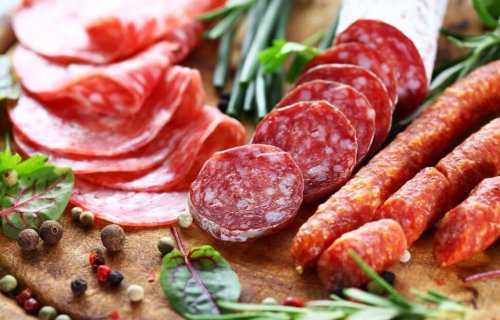The 6 Foods you Should Avoid

If you want to lead a healthy life, the best option is to respect the following list of foods you should avoid. The truth is that they can be harmful and damaging to your body.
Human beings need nutrients, vitamins and minerals to survive. Almost everyone obtains them through food. That’s why there are millions of different foods that are cultural symbols of many countries.
There are delicious foods that are popular and consumed almost everywhere in the world. However, are these foods beneficial to the body, or are they famous only for their taste? Keep reading to find out!
Foods you should avoid to be healthier
1. Most types of bread: foods you should avoid
Bread is a food that people consume in many countries and in different ways. It can be at breakfast, with peanut butter, or at dinner. The fact is that it’s usually a very frequent meal option.
Nonetheless, some bread doughs are made with refined wheat, which is low in essential nutrients and leads to a rapid rise in blood sugar.
Additionally, they usually include other ingredients that aren’t very healthy; such as margarine or sugar, as in the case of sweet bread. Therefore, it’s best to avoid bread or consume those that are made gluten-free and low in carbohydrates, such as ezekiel bread.

2. Vegetable oil
Vegetable oil is mostly used for frying food. Thus, it’s an indispensable ingredient for foods such as French fries, fried chicken, hamburgers, and others.
There are many serious concerns with vegetable oil. It really is one of the foods you should avoid. First, it’s very sensitive to oxidation, causes cholesterol problems, and increases levels of oxidative stress in the body. It has also been linked to an increased risk of cancer.
Due to this, it’s convenient to eliminate or minimize the consumption of meals made with vegetable oil. In turn, it’s advisable to prepare meals with other oils, such as olive; a much more appropriate option.
3. Cakes and cookies: foods you should avoid
Despite being very attractive and delicious, most cookies and cakes are extremely unhealthy. In general, they’re made with refined sugar, refined wheat flour, and added fats, which are often the unhealthy and harmful kind.
These tasty treats are, literally, some of the worst things you can give your body. There are almost no essential nutrients in them; instead, they contain lots of calories and ingredients that don’t contribute anything positive.

4. Fast food
Generally, almost all fast food chains serve junk food. Most of the dishes they offer are mass-produced and highly-designed junk foods with very little nutritional value.
Normally, fast food restaurants are cheap and there are several establishments in all cities. Nevertheless, consuming fast food can be more expensive than one might think since you sacrifice your health enormously.
5. Lunch meats
Hams, sausages, mortadella, salami, and other cold cuts are harmful to our body. The main reason is the high levels of saturated fats they contain.
The approximate amount of fat they contain is 10 to 13 grams per 100 grams of the product. Hence, lunch meats are among the foods you should avoid if you don’t want to suffer from cardiovascular diseases or obesity.

6. Bottled juices
The juices we see in supermarkets, and stores appear to be healthy, but the truth is that they’re often not. Most of the bottled juices are full of sugar, colorings, chemicals, and other substances that are unfavorable to our body.
Some actually contain antioxidants and vitamin C; however, we must weigh this against a large amount of liquid sugar. In fact, fruit juice contains as much sugar as a soda or soft drink; sometimes even more.
Instead of consuming these processed juices, you can drink completely natural juices. They’re much more delicious. On the other hand, water is the best option for drinking since it eliminates toxins, provides better hydration, and keeps the kidneys in good condition.
If you want to enjoy good physical condition and prevent diseases, then you should avoid these foods. It may be a little uncomfortable to eliminate certain foods that we’re familiar with; nonetheless, it’s for our own good.
If you want to lead a healthy life, the best option is to respect the following list of foods you should avoid. The truth is that they can be harmful and damaging to your body.
Human beings need nutrients, vitamins and minerals to survive. Almost everyone obtains them through food. That’s why there are millions of different foods that are cultural symbols of many countries.
There are delicious foods that are popular and consumed almost everywhere in the world. However, are these foods beneficial to the body, or are they famous only for their taste? Keep reading to find out!
Foods you should avoid to be healthier
1. Most types of bread: foods you should avoid
Bread is a food that people consume in many countries and in different ways. It can be at breakfast, with peanut butter, or at dinner. The fact is that it’s usually a very frequent meal option.
Nonetheless, some bread doughs are made with refined wheat, which is low in essential nutrients and leads to a rapid rise in blood sugar.
Additionally, they usually include other ingredients that aren’t very healthy; such as margarine or sugar, as in the case of sweet bread. Therefore, it’s best to avoid bread or consume those that are made gluten-free and low in carbohydrates, such as ezekiel bread.

2. Vegetable oil
Vegetable oil is mostly used for frying food. Thus, it’s an indispensable ingredient for foods such as French fries, fried chicken, hamburgers, and others.
There are many serious concerns with vegetable oil. It really is one of the foods you should avoid. First, it’s very sensitive to oxidation, causes cholesterol problems, and increases levels of oxidative stress in the body. It has also been linked to an increased risk of cancer.
Due to this, it’s convenient to eliminate or minimize the consumption of meals made with vegetable oil. In turn, it’s advisable to prepare meals with other oils, such as olive; a much more appropriate option.
3. Cakes and cookies: foods you should avoid
Despite being very attractive and delicious, most cookies and cakes are extremely unhealthy. In general, they’re made with refined sugar, refined wheat flour, and added fats, which are often the unhealthy and harmful kind.
These tasty treats are, literally, some of the worst things you can give your body. There are almost no essential nutrients in them; instead, they contain lots of calories and ingredients that don’t contribute anything positive.

4. Fast food
Generally, almost all fast food chains serve junk food. Most of the dishes they offer are mass-produced and highly-designed junk foods with very little nutritional value.
Normally, fast food restaurants are cheap and there are several establishments in all cities. Nevertheless, consuming fast food can be more expensive than one might think since you sacrifice your health enormously.
5. Lunch meats
Hams, sausages, mortadella, salami, and other cold cuts are harmful to our body. The main reason is the high levels of saturated fats they contain.
The approximate amount of fat they contain is 10 to 13 grams per 100 grams of the product. Hence, lunch meats are among the foods you should avoid if you don’t want to suffer from cardiovascular diseases or obesity.

6. Bottled juices
The juices we see in supermarkets, and stores appear to be healthy, but the truth is that they’re often not. Most of the bottled juices are full of sugar, colorings, chemicals, and other substances that are unfavorable to our body.
Some actually contain antioxidants and vitamin C; however, we must weigh this against a large amount of liquid sugar. In fact, fruit juice contains as much sugar as a soda or soft drink; sometimes even more.
Instead of consuming these processed juices, you can drink completely natural juices. They’re much more delicious. On the other hand, water is the best option for drinking since it eliminates toxins, provides better hydration, and keeps the kidneys in good condition.
If you want to enjoy good physical condition and prevent diseases, then you should avoid these foods. It may be a little uncomfortable to eliminate certain foods that we’re familiar with; nonetheless, it’s for our own good.
All cited sources were thoroughly reviewed by our team to ensure their quality, reliability, currency, and validity. The bibliography of this article was considered reliable and of academic or scientific accuracy.
- Harvard Health Publishing. (2018) Glycemic index for 60+ foods. Measuring carbohydrate effects can help glucose management.
- Ramsden, C. E., Ringel, A., Feldstein, A. E., Taha, A. Y., MacIntosh, B. A., Hibbeln, J. R., … Douglas Mann, J. (2012). Lowering dietary linoleic acid reduces bioactive oxidized linoleic acid metabolites in humans. Prostaglandins Leukotrienes and Essential Fatty Acids, 87(4–5), 135–141. https://doi.org/10.1016/j.plefa.2012.08.004
- Gago-Dominguez, M., Yuan, J. M., Sun, C. L., Lee, H. P., & Yu, M. C. (2003). Opposing effects of dietary n-3 and n-6 fatty acids on mammary carcinogenesis: The Singapore Chinese Health Study. British Journal of Cancer, 89(9), 1686–1692. https://doi.org/10.1038/sj.bjc.6601340
- Turpeinen, A. M., Basu, S., & Mutanen, M. (1998). A high linoleic acid diet increases oxidative stress in vivo and affects nitric oxide metabolism in humans. Prostaglandins Leukotrienes and Essential Fatty Acids, 59(3), 229–233. https://doi.org/10.1016/S0952-3278(98)90067-9
- Rodríguez Delgado, J., Hoyos Vázquez, M. S., Blesa Baviera, L. C., Cantarero Vallejo, M. D., Carbajo Ferreira, Á. J., Cenarro Guerrero, M. T., … Vegas Álvarez, A. M. (2017). Fruit juices and their role in infant feeding. Should we consider them as another sweetened beverages? Positioning of the gastroenterology and nutrition group of the AEPap . Pediatria de Atencion Primaria, 19(75), e103–e116. Retrieved from https://www.scopus.com/inward/record.uri?eid=2-s2.0-85030553878&partnerID=40&md5=c13bf709227219cfc8cc65b06bb59a29
This text is provided for informational purposes only and does not replace consultation with a professional. If in doubt, consult your specialist.








